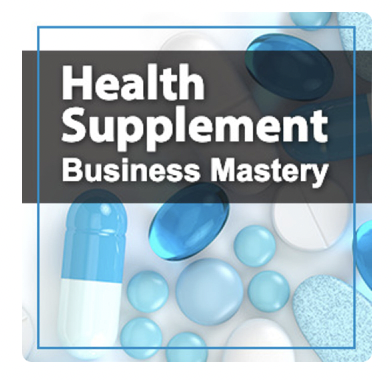There are two types of supplement businesses and one of them is quickly rising to the top.
The first one sells off-the-shelf, white-label products.
The second one sells unique products and formulations.
The first type worked very well 5 years ago, and it can still work in certain sub-niches.
But it’s getting harder to make it work today in today’s competitive supplement business landscape.
Here’s what one supplement business owner has to say.
“I know one brand, it’s a coffee replacement brand that built up a huge subscription base back when Facebook ads were super easy, and now if you’re trying to go toe-to-toe with them, they can just crush you, because they can take probably double of a cost per acquisition that you can, because they’ve just been able to maintain this huge subscriber base.”
The first type of business is more difficult to build now that the market has changed.
The competition has increased.
The cost to acquire a customer (CPA – cost per acquisition) has gone up.
And as a result, the need for higher average order value (AOV) is also rising and putting more pressure on selling on the initial sale to offset the cost per acquisition of new customers.
On top of that the supplement customer has changed.
We’re at a point where the customer sophistication and awareness level for supplements is very high.
At least for some categories.
For example, people are more aware of probiotics or fish oil, a supplement that’s really basic. This makes it very difficult to compete using the first type of business model.
Just selling a white-label drop ship supplement in categories where sophistication and awareness is high is tougher.
One reason is that those supplements are so prevalent at brick-and-mortar stores for really low prices.
In that situation, the way to win is to lean in on the unique mechanism and emotional storytelling with your marketing.
Something that the brick-and-mortar stores and standard e-commerce supplement sites are not doing.
The drop ship supplement business challenges are forcing more aggressive marketing.
In order to overcome all the challenges of higher acquisition costs, marketplace awareness, and brick-and-mortar / Amazon prices.
For those supplement businesses, there’s more focus on top-of-funnel advertising to pull in as many new buyers as possible because the clock is ticking on the opportunity for that supplement.
Remember, there are no inventory holding costs for this type of business. So you can pour all of the money into advertising and scale.
Plus there are no constraints on inventory so in order to grow and make the economics of the business work acquisition of new customers has to be over the top peddle to the metal.
Now there are still pockets and sub-niches within supplements where the sophistication and awareness level is still very low.
For those pockets, it may still make sense to compete using that first type of supplement business.
The off-the-shelf business, and compete on marketing alone.
Then as the customer matures on the sophistication and awareness scale move up the chain to the unique proprietary formulation.
If the competition and sophistication of the market do not surpass the speed at which you can build a foothold.
Let’s look at the alternative.
The Second Type of Supplement Business
The second type of business has a more bespoke product line.
It has a built-in unique formulation or some other differentiator that can be used as positioning in marketing.
So it may be easier to sell your products because you have a different ingredient story or a unique mechanism that’s built into the bespoke formulation.
This second type of company can still benefit from the same marketing strategy that the first employed because, after all, they are both supplements.
Customer acquisition at breakeven is the goal of any business with an economic model that makes more money on the back end with subscription and lifetime value.
But the economics of each type of supplement business is completely different.
The bespoke supplement company has the added challenge of inventory constraints limited by the cash investment available.
It may be challenging to get quantity discounts because of cash restraints or due to the unique formulation or one or two ingredients may be at a premium price which affects the margins.
As a result, a lot of cash is tied up in the second type of business.
So the more unique formulation business needs more money to sustain itself as it scales.
Where that first type of model can use that cash to drive more traffic and sales.
The second type just needs more cash investment to compete and grow at the same rate.
So Which Type of Supplement Business is Best?
Well, that depends on your situation and the amount of investment you have to grow your supplement brand.
Which type of business you build really depends on what timeframe, and capital resources you have available.
With any consumer product, building the initial brand recognition takes time and costs money.
If you have $100,000 or less to invest I recommend you start out with the first type of supplement business, selling a generic drop-ship product.
It always comes back to money and time.
As a supplement entrepreneur, how much money you have to invest in your business, and how much time you have for your runway is vital to success.
Here’s what Jordan the CEO of Zuma Nutrition has to say:
“Early on it’s easy to panic when you’re spending money, but actually, you’re investing into your business and it’s important. That’s why you need cash, you literally need it to build a business. It’s like building a house, you can’t build a house without buying wood.”
Starting a Supplement Business From Scratch Can Be Challenging
Businesses need cash.
Cash is like the blood of the business.
You need it in order to get any sales and you need more of it than you think.
It could come from the entrepreneur’s personal debt or investors’ equity, but either way, it comes down to funding growth.
Many people have an almost unrealistic expectation of what it takes to get a supplement business off the ground.
Too much misinformation out there says all you need to do is add your product to Amazon or get some influencer to promote it for you and you’ll be set.
Both of those ideas couldn’t be further from the truth.
It takes time and money to grow any business.
And always way more than you think or have.
Personally, I don’t think it’s possible to bootstrap a business with revenue from the business alone.
Putting the profits back into the company for several years is pretty much required when you’re getting started.
But if all of your funding is coming out of revenue, you’re most likely going to fail.
Without cash, you can’t keep the many business mechanisms moving.
Things like, inventory, fulfillment, advertising, etc. need to keep spinning in order to have the cash coming in.
If you stop any one of those things it’s akin to stopping the flow of blood in the body. If you do that, then the whole thing’s going to seize up.
Every business needs cash so that you can scale and optimize.
Many people think passion is the key. But, passion doesn’t equal success. It just means that you’re going to be more likely to get through the difficult times.
If you’re not passionate, it’s going to be harder for you to get through the days when you’re frustrated and burnt out.
So Which Type of Supplement Business Have You Built or Want to Build?
There’s not one type of supplement business that’s better, than the other. They are really just two different businesses.
And there’s no reason why you can’t have a business that sits in the middle of both types.
With some bespoke products and other white labels.
You can also start with white-label products and then after building cashflow and systems within the business you can transition from white-label products to a more unique product line.
No matter which you choose it still comes down to acquiring a customer and making enough money off of that customer over their lifetime to make a profit.
Discover the 3 funnels that can help your health supplement business succeed.

Listen to the Health Supplement Business Mastery Podcast for for dietary supplement entrepreneurs and marketers.



